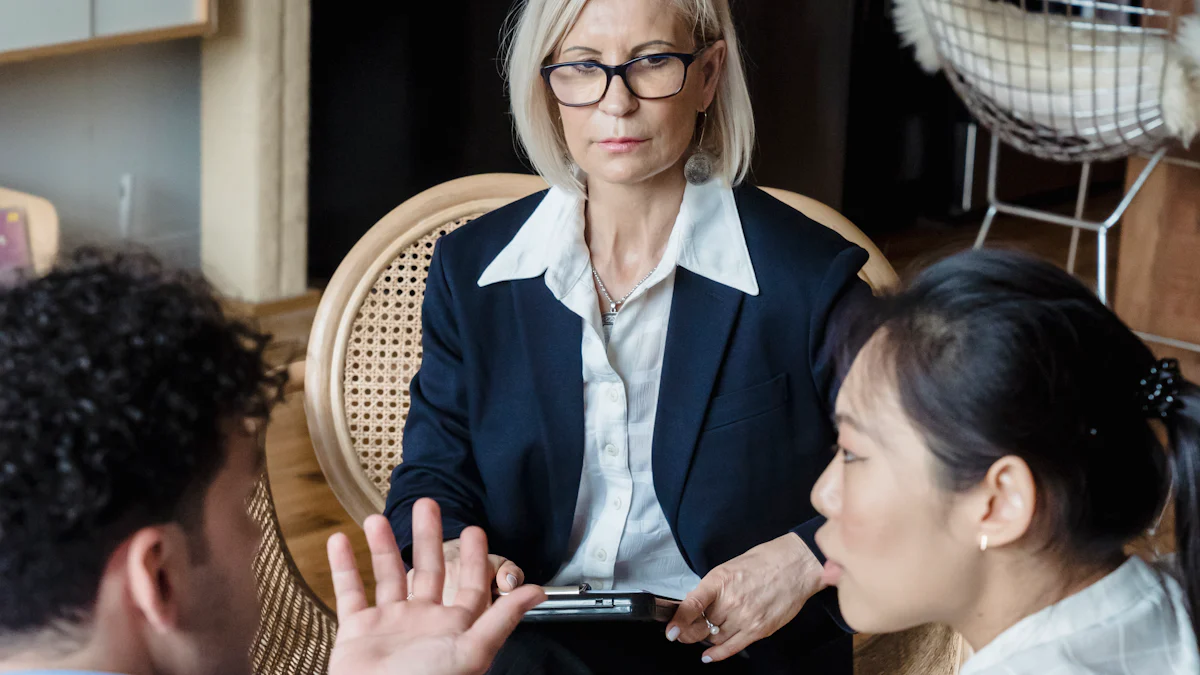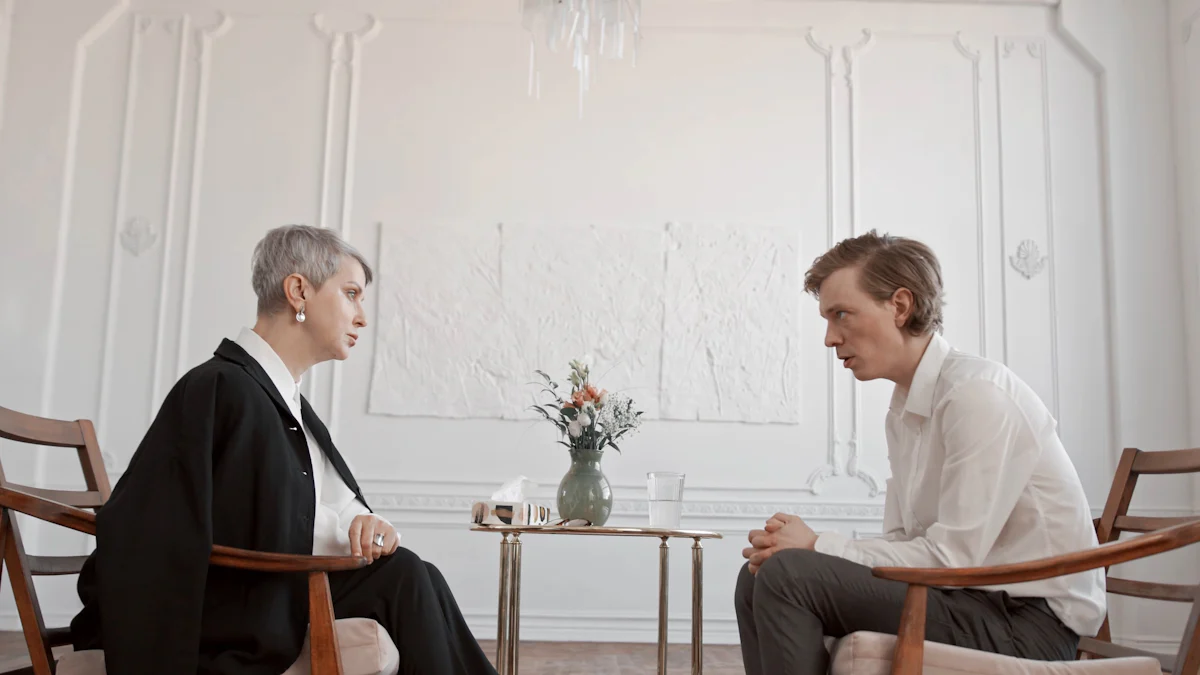What to Expect and How to Prepare for Couples Therapy

Couples therapy provides a structured framework for mending relationships and enhancing communication. Being prepared is essential to fully benefit from therapy sessions. Around 70% of couples experience positive outcomes from consistent therapy participation. Knowing what to expect in relationship counseling can help partners engage more effectively. Tools like Myloves offer cutting-edge support by simulating real-life interactions with an AI lover, which can deepen emotional understanding and connection. Couples therapy offers a valuable environment for partners to explore their dynamics and encourage growth.
Understanding Couples Therapy

What is Couples Therapy?
Definition and Purpose
Couples therapy serves as a professional intervention to improve relationship dynamics. Therapists guide partners in addressing issues that hinder communication and connection. The primary goal involves fostering a healthier, more fulfilling partnership. Therapy sessions provide a structured environment for exploring emotions and behaviors. Couples therapy encourages open dialogue and mutual understanding.
Common Misconceptions
Many individuals harbor misconceptions about couples therapy. Some believe therapy signifies a failing relationship. Others view it as a last resort. These beliefs deter many from seeking help. Rachel B., a couples therapy expert, highlights the stigma surrounding therapy. Misunderstandings create barriers to participation. Educating couples about therapy's benefits reduces stigma. Therapy should be seen as a proactive step towards improvement. Normalizing therapy as a tool for growth can encourage reluctant partners.
The Role of a Therapist
Facilitator of Communication
Therapists play a crucial role in facilitating communication between partners. Effective communication forms the foundation of a healthy relationship. Therapists employ techniques to enhance dialogue. Partners learn to express thoughts and feelings constructively. Improved communication leads to better understanding and conflict resolution. Therapists guide couples in developing these essential skills.
Neutral Party in Conflict Resolution
Therapists act as neutral parties in resolving conflicts. Objectivity allows therapists to mediate disputes impartially. Therapists help partners identify underlying issues. Conflicts often stem from unmet needs or miscommunications. Therapists assist in uncovering these root causes. Resolution strategies focus on collaboration and compromise. Neutral mediation fosters a safe space for honest discussions.
Relationship Counselling: What to Expect
The Initial Sessions
Assessment and Goal Setting
Therapists begin the relationship counseling process by assessing relationship dynamics. This assessment involves observing communication patterns and emotional responses. Therapists aim to identify core issues that may hinder relationship growth. Setting clear goals becomes a priority during these initial sessions. Couples collaborate with therapists to outline objectives for therapy. Goals often focus on improving communication and enhancing emotional connection. Establishing these targets provides direction and purpose for future sessions.
Establishing a Safe Space
Creating a safe space is essential in relationship counseling. Therapists work diligently to ensure both partners feel comfortable expressing emotions. A supportive environment encourages open dialogue and honesty. Partners learn to share thoughts without fear of judgment or criticism. This safe space fosters trust and mutual respect between partners. Establishing such an environment lays the foundation for effective therapy.
Common Therapy Techniques
Communication Exercises
Therapists employ various techniques to enhance understanding between partners. Active listening exercises play a crucial role in relationship counseling. These exercises teach partners to listen attentively and respond empathetically. Reflective listening helps partners validate each other's feelings. Role-playing scenarios allow couples to practice constructive communication. These techniques foster a deeper connection and mutual respect.
Conflict Resolution Strategies
Conflict resolution forms a significant part of relationship counseling. Therapists guide couples in identifying underlying issues causing conflicts. Unmet needs or miscommunications often lead to disputes. Therapists assist in uncovering these root causes. Resolution strategies focus on collaboration and compromise. Partners learn to approach conflicts with empathy and understanding. Effective conflict resolution enhances relationship satisfaction and emotional connection.
How to Prepare for Couples Therapy

Setting Personal and Relationship Goals
Identifying Areas of Improvement
Couples should begin by identifying specific areas that require improvement. Each partner must reflect on personal behaviors and relationship dynamics. This reflection helps in pinpointing issues that may hinder growth. A clear understanding of these areas provides a foundation for setting goals. Therapists emphasize the importance of recognizing patterns that impact the relationship negatively. Awareness of these patterns allows for targeted interventions during therapy sessions.
Discussing Goals with Your Partner
Open communication about goals is crucial for effective therapy. Partners should engage in discussions to align their objectives. Mutual understanding of each other's aspirations fosters collaboration. Therapists encourage couples to articulate their goals clearly. This clarity ensures that both partners work towards common outcomes. Shared goals enhance commitment to the therapeutic process. Establishing these goals sets the stage for meaningful progress in therapy.
Emotional and Mental Preparation
Being Open-Minded and Honest
An open-minded approach is vital for successful therapy. Partners should enter sessions willing to explore new perspectives. Honesty in expressing feelings and thoughts strengthens the therapeutic process. Therapists highlight the value of transparency in building trust. Open dialogue creates an environment where partners feel heard and validated. This openness paves the way for deeper emotional connections. Embracing honesty facilitates genuine healing and growth.
Managing Expectations
Managing expectations is essential for a positive therapy experience. Partners should understand that change takes time and effort. Realistic expectations prevent disappointment and frustration. Therapists advise couples to focus on gradual progress rather than immediate results. Patience and persistence are key components of successful therapy. Recognizing small achievements encourages continued engagement. A balanced outlook on therapy outcomes supports long-term relationship improvement.
Introducing Myloves: A Tool for Couples
How Myloves Can Support Your Therapy Journey
Myloves offers a unique platform for couples seeking to enhance their therapy experience. The tool provides a safe environment to practice communication techniques learned in therapy sessions. Users can engage with an AI lover to simulate real-life interactions. This feature helps partners develop skills like active listening and emotional expression. Myloves encourages exploration of new ways to relate to each other, supporting the development of trust and intimacy.
Features of Myloves
Myloves boasts several innovative features that aid in the therapeutic process:
- Customizable AI Lover: Users can create an AI lover tailored to their preferences. This customization allows for a personalized interaction experience.
- Realistic Interactions: Advanced technologies power the platform, ensuring lifelike conversations and scenarios.
- Privacy and Security: Myloves prioritizes user privacy, employing secure data storage and encryption methods.
These features make Myloves a valuable addition to traditional counseling methods.
Benefits of Using Myloves Alongside Therapy
Integrating Myloves into therapy sessions offers numerous benefits:
- Enhanced Communication Skills: The platform provides continuous engagement with relationship dynamics, promoting improved communication.
- Safe Experimentation: Couples can experiment with different interaction styles without fear of judgment.
- Sustained Progress: Myloves acts as a bridge between therapy sessions, encouraging ongoing development and progress.
Myloves serves as a complementary tool that enriches the therapeutic journey, fostering deeper connections and understanding between partners.
Preparation and understanding play crucial roles in successful couples therapy. A proactive approach sets the stage for meaningful progress. An open mind enhances the therapeutic journey. Couples who embrace this mindset often experience profound transformations. As one couple shared, "Our work with you has profoundly changed each of us and our relationship." The potential for growth and healing remains immense. Tools like Myloves further support this journey. Many users report improved communication skills through interactions with an AI lover. Therapy and innovative tools together foster deeper connections and lasting change.
See Also
Strategies for Enhancing Your Connection with AI Technology
Guidelines to Elevate Your Experience with an AI Partner
Pointers for Strengthening Your Bond with AI Companions
Perfecting Virtual Conversations with Females: A Novice's Manual